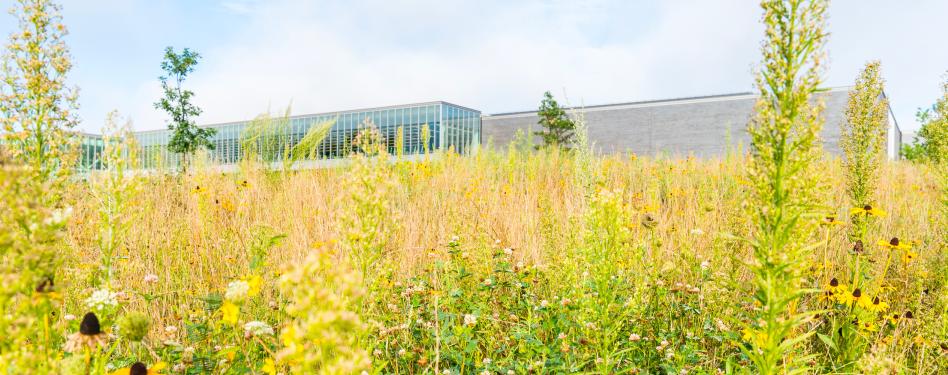
Image credit: Colby College.
In Waterville, Maine, Colby College has long connected environmental stewardship and education. The small liberal arts college has one of the oldest environmental studies majors in the country, and it achieved carbon neutrality in 2013. It now has 17 LEED-certified buildings on campus, two SITES-certified areas of landscape and a third SITES project under way. In fact, Colby plans to use the Sustainable SITES Initiative as its campus landscape standard for all major projects moving forward.

Image credit: Colby College.
The most recent project on campus, the LEED Platinum Harold Alfond Athletics and Recreation Center, boasts views of sweeping meadows and fields that cover a fifth of the developed campus area. Approximately 15 acres of land surrounding the center are now SITES Gold—joining the already SITES-certified Athletic Fields. The SITES certification process was led by Thornton Tomasetti in collaboration with the design team of Hopkins Architects, Sasaki, Arup and MVVA. Learn more about how Colby College’s SITES certifications are fostering human health and well-being:
The Athletic Fields play an integral part in the campus's environmental health and that of its wetland habitats. Basins under the athletic fields capture stormwater, slowing and cleaning runoff, with rain and soil sensors regulating water use. The new field requires 15,000 fewer gallons of irrigation each season than it did before. Wet meadow basins capture roof runoff and are used for teaching and research purposes.
“We have also seen a 99.2% reduction in outdoor water use through the changes made to achieve SITES certification,” notes Amundsen. “This almost entirely eliminated irrigation on-site through our careful plant selection.” The Athletics Center project boasts 1 million square feet of native plants. The shift toward more sustainable landscape design has significantly decreased maintenance needs and carbon emissions as well, an output Colby carefully monitors, as a carbon-neutral school.
